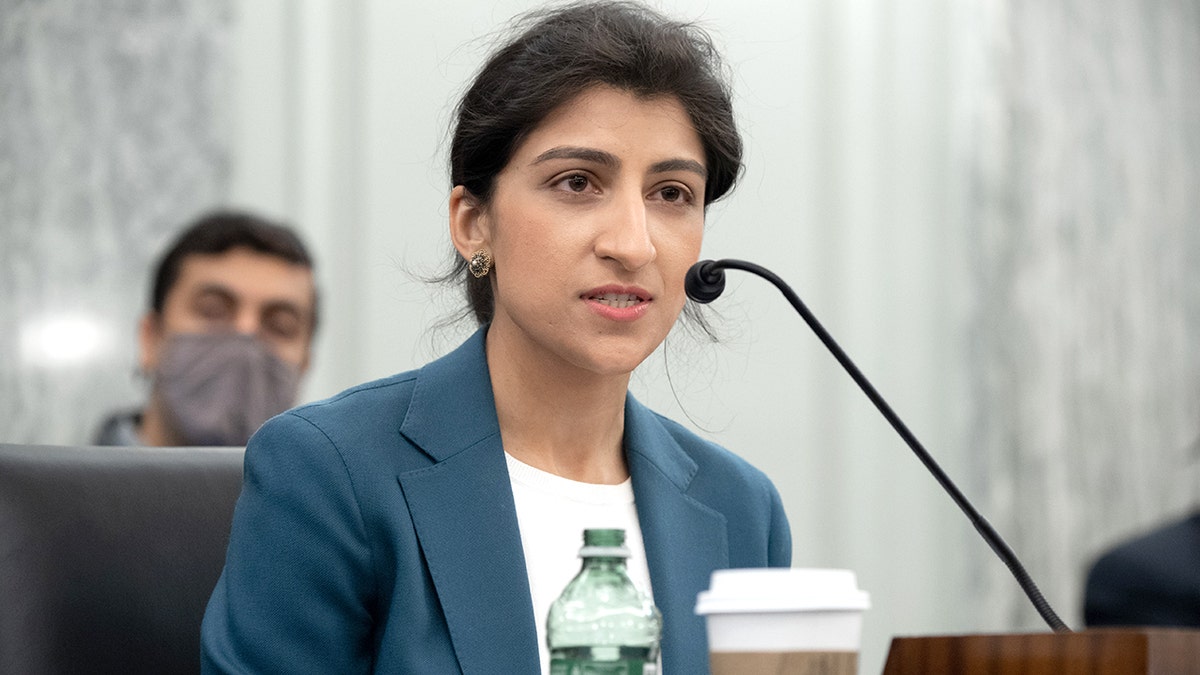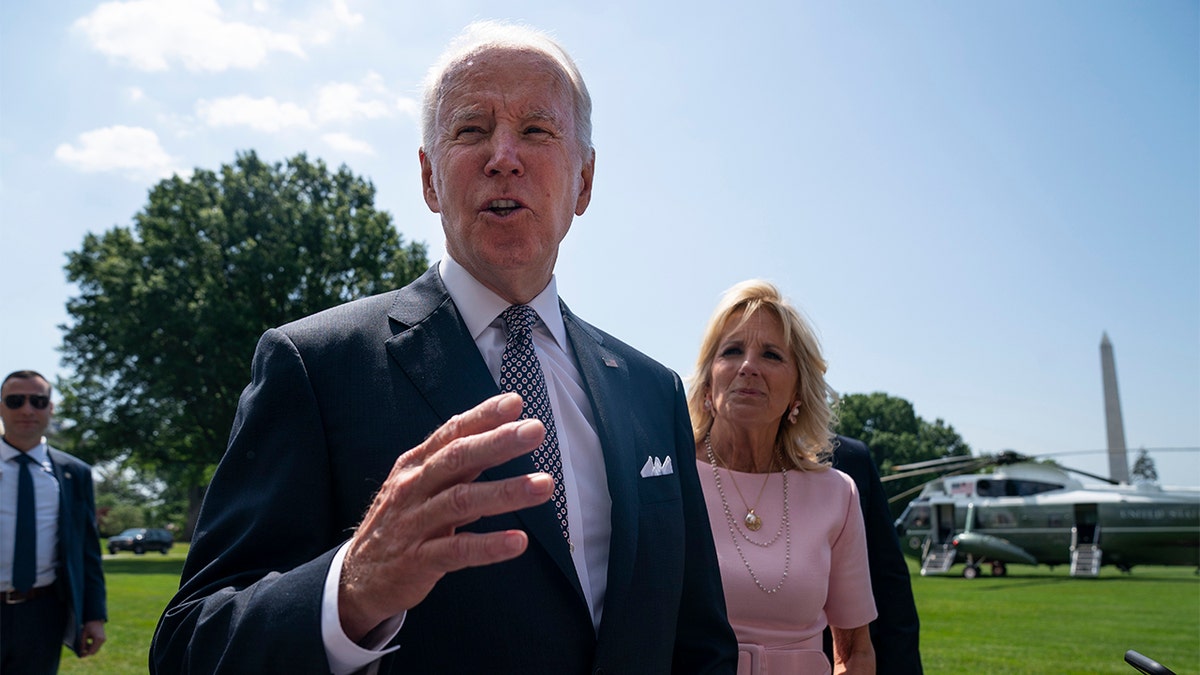Jim Jordan challenges FTC's Lina Khan on Twitter consent decree, Elon Musk obsession
House Judiciary Committee Chairman Jim Jordan accused the Federal Trade Commission's Lina Khan of 'harassing' Twitter since Elon Musk's takeover.
A Biden administration agency has quietly leaned on a web of technology and antitrust advocacy groups funded by George Soros and other progressive billionaires for critical policy and enforcement roles, Fox News Digital has learned.
The Federal Trade Commission (FTC), tasked with protecting consumers, has previously faced criticism over its "revolving door" with regulated industries. Now, it has not only relied on a handful of groups for their expertise but has pulled individuals from a network funded by the same small collection of affluent Democrat donors for crucial government positions.
It's the latest illustration of how the Biden administration has counted on outside organizations that receive considerable funding from progressive benefactors. Soros' Open Society Foundations, for instance, has also bankrolled an organization called Governing for Impact that works behind the scenes with the administration on policy and has boasted of implementing dozens of regulatory agenda items in its internal documents.
"Our grantees give voice to people outside of Washington, in Washington," an Open Society Foundations spokesperson told Fox News Digital. "We're proud of our work and our grantees' work to protect the interests of people in the United States who are all too often excluded from the policymaking process."

The FTC, under chair Lina Khan, appears to have relied on a handful of technology and antitrust groups all funded by the same group of progressive donors. (Saul Loeb-Pool/Getty Images)
Under chair Lina Khan, the FTC has faced accusations of sidelining career staff as it appears to have relied on dark money nonprofits. Earlier this year, Christie Wilson, the sole Republican on the commission, stepped down and admonished Khan in her resignation letter.
"Under her leadership, knowledgeable career staff have been scorned and sidelined," Wilson charged in her March resignation letter. "Most notably, early in her tenure, a gag order was imposed on staff that prevented them from engaging in consumer and business education — a vote of no confidence in our staff and a disservice to those we serve."
Khan has turned to the groups backed by the cadre of deep-pocketed donors and institutions for personnel hires within the commission, many of whom assisted from leadership positions, as she's pursued a forceful antitrust strategy that mirrors the organizations' committed goals.
The FTC refused to comment for this story.
Earlier this year, Khan tapped Sarah Miller, who previously led the American Economic Liberties Project (AELP), an antitrust advocacy group, as a "special adviser." AELP's financial backers have included Soros' Open Society Foundations, Pierre Omidyar's Omidyar Network and the Ford Foundation. According to tax documents and grant databases, each organization provided AELP between $200,000 and $500,000.
Miller is married to former Bernie Sanders aide Faiz Shakir, the founder of another leading antitrust advocacy organization called More Perfect Union (MPU). MPU and its affiliated advocacy arm, More Perfect Union Action, have also received hundreds of thousands in backing from the Soros, Omidyar and Ford networks.
When Miller moved to the FTC, her former group, AELP, made her husband Shakir its interim leader. At the time, AELP also elevated former Omidyar Network consultant Nidhi Hedge to its managing director position, a press release on its website stated, underlining the intimacy of the network.
Politico reported that Miller was elevated to Khan's chief of staff in November after acting as her aide.

The Biden administration has been shown to rely on left-wing groups for policy recommendations. (AP Photo/Evan Vucci)
"The American Economic Liberties Project is a nonpartisan, independent, mission-oriented organization that does not accept any corporate donations," AELP told Fox News Digital, adding that they publish "original policy research and submits feedback on rules when agencies ask for public comment — as do many other civil society organizations, trade associations, small business owners and workers."
"We have been glad to see FTC Chair Khan and other enforcers take on the work of serving the public interest on behalf of entrepreneurs, small businesses, consumers, and workers," AELP said. "Sarah Miller is a seasoned policy adviser who has served in multiple roles in the government throughout her career, and we were proud to see her join the FTC."
"For decades, there has been a revolving door between big business and government that has hurt small businesses and working people, and we are glad to see this FTC hire professionals who are dedicated to serving its mission, not former Amazon and Meta lobbyists," AELP continued.
The FTC has also looked to another nonprofit called the AI Now Institute, which focuses on artificial intelligence as an antitrust issue. Over the past few years, the agency has quietly enlisted several of its employees as officials at one time or another.
The FTC appointed AI Now founder Meredith Whittaker as a "senior adviser on artificial intelligence" in 2021.
The FTC appointed at least four other AI Now staffers — Amba Kak, Sarah Myers West, Alejandro Calcaño and Varoon Mathur — to advisory roles. In fact, the FTC had effectively tapped AI Now's entire organization, as every individual now listed as a "team" member on the group's website had been called upon to advise the commission in recent years.
The FTC initially hired Kak and West for technical and advisory roles without noting work on enforcement matters. However, in August 2022, the FTC amended their job descriptions to include "supporting Bureau staff on cases and enforcement matters" and "collaborating closely with staff and leadership to provide insights on emerging tech issues and market development trends that could lead to enforcement efforts."

George Soros' Open Society Foundations, along with two other progressive donor networks, supplied funding to the groups Khan appears to have relied on during her tenure. (Jason Alden/Bloomberg via Getty Images | Kevin Dietsch/Getty Images)
AI Now has obtained funding from the three progressive networks like the other two organizations. Its website lists just four donors, including Soros' Open Society Foundations, Omidyar's network, the Ford Foundation and Luminate, which Pierre and Pam Omidyar established, the Omidyar Group's website states.
The FTC has credited individuals from AI Now that it previously brought on as advisers with helping craft policy and messaging in at least two posts on its website this year and in one report to Congress last year.
The AI Now Institute also published a report in April of this year emphasizing the need for stricter regulation of biometric data in technology products. Around a month after the report was released, the FTC adopted a policy statement on the "unfair or deceptive acts and practices related to the collection and use of consumers' biometric information."
The FTC began developing regulations for AI data collection and "algorithmic decision-making" that same month.
The commission additionally tapped Erik Martin as an adviser in late 2021. Martin previously worked for the Democracy Fund, which is "solely funded" by Omidyar and is "incubated inside the Omidyar Network," according to Democracy Fund's website.
Like AI Now's Kak and West, Martin's job description did not initially reference FTC enforcement matters. In August 2022, it was amended to indicate he would assist Bureau personnel with "cases and enforcement matters" and work "collaborating closely with staff and leadership to provide insights on emerging tech issues and market development trends that could lead to enforcement efforts."

Pierre Omidyar, the billionaire founder of eBay, contributed heavily to organizations supporting protests in the wake of George Floyd's murder, while also investing in private security startups. (Ramin Talaie/Corbis via Getty Images)
Meanwhile, the FTC also turned to law professor John Kwoka as an adviser in 2021. Kwoka previously advised the Open Markets Institute, where Khan herself was the director of legal policy. The Soros, Omidyar and Ford networks have all passed grants to the Open Markets Institute.
Wilson, the lone FTC Republican who resigned from the commission earlier this year, criticized Khan's leadership on her way out.
"My fundamental concern with [Khan’s] leadership of the commission pertains to her willful disregard of congressionally imposed limits on agency jurisdiction, her defiance of legal precedent, and her abuse of power to achieve desired outcomes," Wilson wrote in the resignation letter.
The Omidyar Network, Ford Foundation, More Perfect Union and AI Now did not respond to Fox News Digital's requests for comments.














































